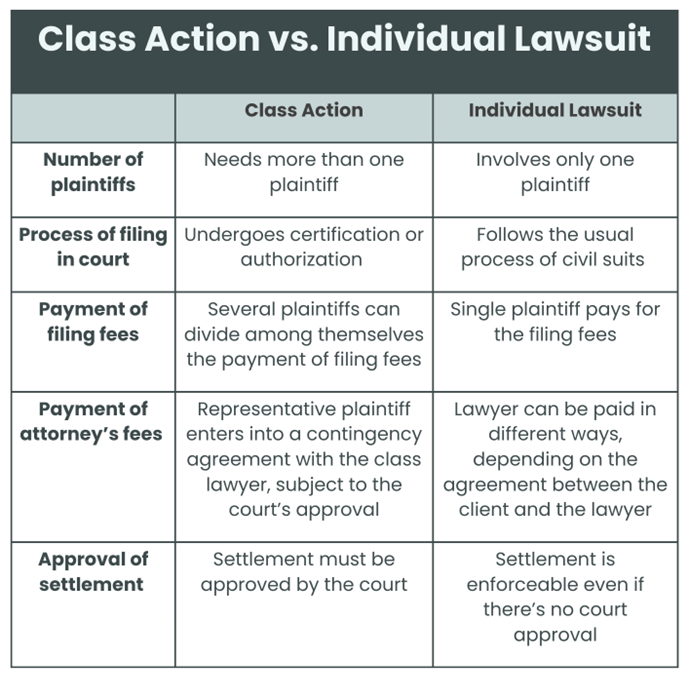People say that there is strength in numbers. However, there are also times that one is better than two or more. It finds application in the law when we talk about class action vs. individual lawsuit. Knowing the differences between the two can help you decide which is the better action to take and which will produce the best results for you or your co-plaintiffs.
What is a class action?
Class actions are civil lawsuits filed by representative plaintiff/s on behalf of a ‘class’ of individuals, who has a common cause of action against a particular defendant/s. This several but common cause is resolved in a single court action, whose award (or settlement) is binding upon all members of the class.
Class actions in Canada are governed by the:
Recent Articles
- enacted provincial statutes (e.g., Ontario’s Class Proceedings Act)
- rules of civil procedure of each province and territory
One of the latest class actions in the country is the Canadian iPhone Power Management Class Action. Know more about this class action and its settlement with this video:
If you want to know more about class actions, you can consult with the Lexpert-ranked best class action lawyers in Canada.
What is an individual lawsuit?
An individual lawsuit, specifically a civil action, is an action filed by a plaintiff against a defendant based on a cause of action. This is different from a criminal case, where the government prosecutes an accused for the crime that was allegedly committed. A class action is a civil case per se but is different from what is usually called an individual lawsuit.
What are the differences between class action vs. individual lawsuit?
There are major differences between a class action and an individual lawsuit, such as the following:
- Number of plaintiffs
- Process of filing in court
- Payment of filing fees
- Payment of attorney’s fees
- Approval of settlement
These differences are further discussed below. It’s important that you as a plaintiff, along with your co-plaintiffs, understand these differences before filing a case in court.
1. Number of plaintiffs
The obvious difference between a class action and an individual lawsuit is how many plaintiffs are involved. A class action has several plaintiffs, while there’s only one plaintiff in an individual lawsuit.
Cases don’t need to have a minimum number of plaintiffs to be considered a class action. At the same time, there’s also no limit of plaintiffs. People can join a class action lawsuit if procedural requirements are met. In other words, what the law is strict about is that these plaintiffs — no matter the number — must comply with the requirements for a class action.
2. Process of filing in court
Another difference between class actions and individual lawsuits is the process of filing the case in court. Starting a class action in Canada undergoes the process of certification for the common law provinces or authorization in Québec, which is absent in an individual lawsuit.
This certification process ensures that the class action meets the following tests:
- plaintiffs have a cause of action against the defendant
- there’s a defined class of plaintiffs
- there’s commonality in the issues presented by the class
- class action is the preferable procedure
- there’s a representative plaintiff to speak up for the interests of the class
However, the filing of an individual lawsuit or a civil case is different from that of a class action. In addition, the process of starting a civil case will also depend on the type of civil case (e.g., action, application, small claims).
3. Payment of filing fees
Every case filed in court will need the payment of filing fees. In a class action, the filing fees, no matter the amount, can easily be paid by the collective plaintiffs because of their numbers. In an individual lawsuit, it’s a one-to-one, where a plaintiff pays for the filing fees upon filing in court.
If there’s a chance that the individual payout is smaller compared to the filing fees when filed individually, then a class action would be a better option. This is better for class actions, aside from the fact that the filing fees can be divided among the plaintiffs.
4. Payment of attorney’s fees
Aside from the court filing fees, class actions and individual lawsuits differ on the payment of legal fees or attorney’s fees. In a class action, the representative plaintiff usually enters into an agreement with the class lawyer; this agreement must be approved by the court. Class lawyers are paid on a contingency basis, where they share a part or a percentage of the award or settlement.
On the other hand, lawyers are paid in many ways in an individual lawsuit, such as the following fee arrangements:
- hourly billing
- fixed or flat fees
- contingency fees
- retainer fees
5. Approval of settlement
Since both are civil cases in themselves, parties in a class action or in an individual lawsuit may reach a settlement. This can be done either before a judgement is made by the court or during the pendency of the action.
However, in a civil individual lawsuit, parties need not go to court when they’ve reached a settlement. This is different in a class action, since the settlement agreement must be approved by the court.
When it comes to enforcement, both settlement agreements in a class action and in an individual lawsuit can be enforced by the court.
Class action vs. Individual lawsuit: key distinctions
Here’s a summary of the important differences between a class action and an individual lawsuit:

As we have seen, the key differences in a class action vs. individual lawsuit extend beyond just the number of plaintiffs. Understanding these distinctions will prepare you for what to expect in either scenario.
For personalized guidance on your case, it's best to consult a legal expert who can offer deeper insights into both class action and individual lawsuits.
Want to know more about the distinction of a class action vs. individual lawsuit? You can reach out to the best class action law firms in Canada.





